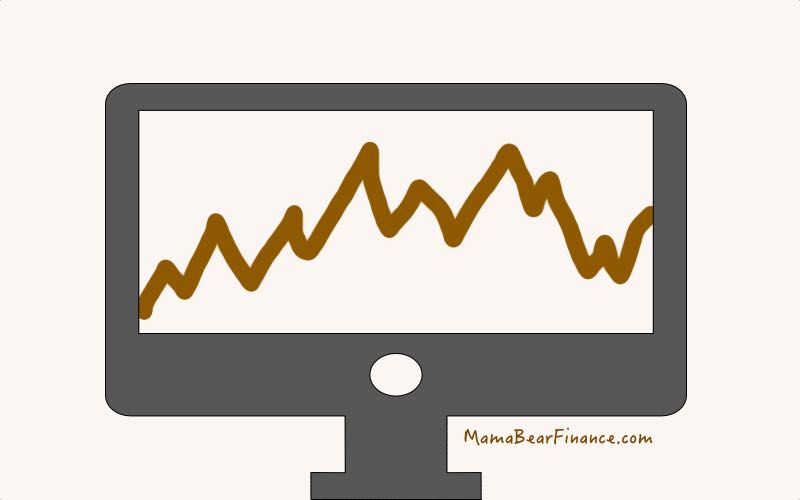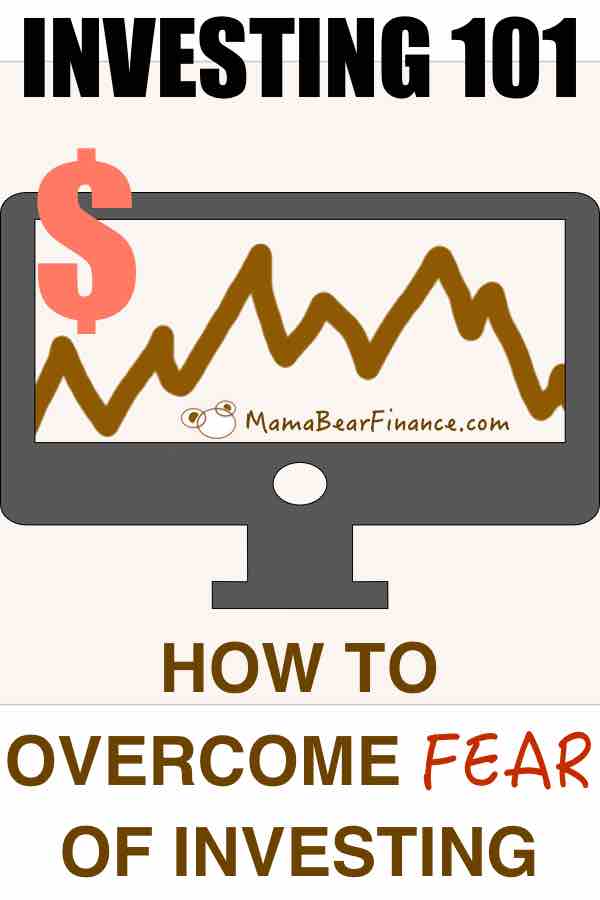Investing is the proven way to build wealth yet the fear of investing often stops us on our track.
If you struggled with investing, your biggest fear might be about losing your investment.
I was once in your shoes. This takes me back to 2008 when one of my finance professors joked in class that he’ll fail us all so that we don’t have to graduate yet.
Everything at the time – from stocks to housing – was dropping in value.
Investors were selling at a rampant speed to stop further losses. People were laid off and companies had hiring freeze.
It was a scary time, and investing was as reckless as going clubbing in a tightly pack room without a mask.
But, we’ve seen in history time and time again that investing is an important way to grow and preserve wealth.
This is especially true during a time of rising inflation. As our dollar shrinks in value, not investing means we are losing wealth along the way.
To find the solution, let’s take a closer look at the problem.

This post may contain affiliate links, which means I may receive a commission, at no extra cost to you, if you make a purchase through a link. Please see my full disclosure for further information.
The Problem with Investing (And Solution)
The biggest problem we have when it comes to investing is controlling our emotions.
These emotions will change throughout our entire investing journey.
Naturally, when you invest based on emotions, you have a higher chance of making irrational choices.
Here’s some of the emotions I’ve experienced and my solutions to control them.
1. Fear of Losing Money
By far the biggest emotion for novice investor is probably fear of losing money. This is not unusual since being new to the investment world means that one had less information at disposal.
I distinctively remember the idea of investing in bitcoin when it cost about $100 each.
My husband and I had attended a workshop on blockchain technology and that’s when the idea of bitcoin was introduced.
We talked about perhaps investing in ten bitcoins amounting to $1,000 worth of investment. Then the price of it went up rapidly and $1,000 for ten bitcoins turned into $3,000.
Soon we had lost interest because throwing away thousands of dollars for something we don’t fully understand felt foolish.
Obviously, if we hand’t let fear taken over, we would have had ten bitcoins today and I don’t need to tell you how much that would be.
So the fear of losing money has led to our inaction and doubt.
Invest What You’re Comfortable of Losing
In the end though, I still don’t feel comfortable about investing in bitcoin.
Sure, the idea of a decentralized currency may sound revolutionary, but in the end it has just resulted in mass speculation. Not to mention, the enabling of black markets.
Admittedly, my understanding about bitcoin is still very limited and so I don’t foresee investing in it anytime soon.
The solution to overcome the fear? Learn more about an investment to the point that you’re comfortable about investing.
If you’re still struggling to invest even knowing all that you can to know about an investment, then just start small.
Instead of adamantly to have ten bitcoins at the time, maybe we should have been okay with just one or two. In this sense, we’ll be more comfortable losing a few hundreds than a few thousands.
In summary, to avoid struggling to invest and overcome your fear, increase your knowledge and invest in a small enough portion that you’re comfortable to lose.
Over time, as you build on your knowledge about a particular investment, you’ll naturally increase your holding while minimizing the fear.
2. Fear of a Pending Bubble
Just when the Financial Times reported the end of “The longest U.S. stock market bull run,” back in March, the stock market bounced right back!
A bull run in the stock market means that the prices are rising or expected to rise.
Sometimes, this rise can be rightfully justified, e.g. during a healthy economy.
But in today’s unprecedented high unemployment coupled with a public health crisis, it’s strangely odd that the stock market is hitting record high.
And so even if you’re invested in a rising stock market, you can’t help but question whether a bubble is about to pop.
This fear can drive us to sell prematurely as we capture temporary profits in lieu of longer term gains.
That’s why it’s critical to know your investment horizon.
Know Your Time Horizon For Investing
For example, if you’re still in your 20s or 30s, your investment horizon might be decades ahead. Hence, it won’t matter as much if your investment fell on paper.
As long as you don’t sell, your investment aren’t necessary lost.
And if you do panic sell with the worry of a pending bubble, then you might pay the price of timing the market. After all, no one can predict what the market does and so if you try, there’s a high probability that you might not get it right.
Instead of worrying about losing money when the bubble pops, you should focus on buying when prices become low.
So the solution to fear of a pending bubble is just to not look at the daily fluctuation of the stock market (or housing market, etc.) and stay the course.
If your investment horizon is shorter term, then your investment strategy might be a different story.
3. Fear of Missing Out (FOMO)
Finally, a big culprit to fear of investing is FOMO.
This is especially true during today’s landscape when it seems like everyone made money on the stock market or the housing market.
Sometimes, when everyone else is having a great time, you naturally want to join in.
This could be a huge trap!
Over the years, I’ve learned to stop myself from following the herd when it comes to investing.
It doesn’t mean that I always do the opposite of what others do, but to think independently before making a decision.
To do this, I tend to look up information from the source and do my own analysis rather than following the news blindly.
Case in point, when it comes to investing in hot stocks like Apple and Tesla, I often go into their financial statements and conduct my own research.
Yes, this could sound tedious and mundane to some, but it’s actually very critical for any investor.
Imagine you buy a new car or a fridge, you would do some online research to find comparable prices and models right? Why would that be different when buying stocks?
The Case of Tesla
If you look at Tesla 2019 annual report as an example, you’ll learn that the company has lost 2% point in total gross margin from 19% in 2017 and 2018 to 17% in 2019. This is largely attributed to higher cost of sales. (Source: Tesla 2019 annual report, Page 51).
Meanwhile, they’ve sold about $20 billion worth of cars in 2019 while their market capitalization is now about $390 billion.
Assuming an average price of the car to be $40,000 – $45,000 each, they would need to sell around 9 million cars to breakeven that kind of vaulation!
Sure, some may argue that their stock price is “forward looking,” reflecting what’s ahead. However, considering that Tesla had only sold 367,500 units sold last year, it’s hard to imagine that they can rapidly increase their production capacity to justify the current pricing.
Of course, not everyone wants to do the research because it’s time-consuming and does require a basic level of financial understanding. BUT, not doing any research while investing is essentially gambling.
When you realize that everyone is basically gambling on the rise of Tesla, that’s a clear warning sign for me to stay away until the price drops to a more reasonable figure.
How to Overcome the Fear of Investing
In summary, it’s natural that we experience fear when it comes to investing.
What’s important is to keep our emotions under control as we manage our fear.
The solution to do so is by:
- increasing your knowledge through conducting sufficient research
- investing in an amount that you’re comfortable losing (as all investments have a certain degree of risks and thus the rewards aren’t guaranteed)
- evaluating your investment time horizon and setting your strategies accordingly
- thinking independently to avoid FOMO
If you could practice these four ways to manage your emotions, your fear of investing will naturally decrease.

PIN this article

